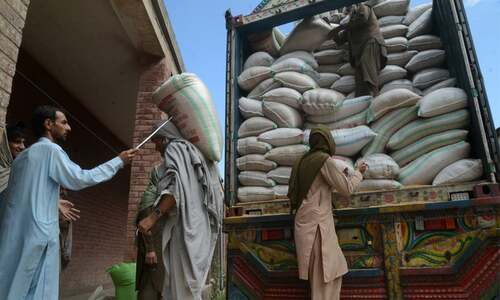MOSCOW: President Bashar al-Assad said it would not be difficult to agree to a new Syrian government including opposition figures, but his opponents responded on Wednesday by saying that no administration would be legitimate while he remained in office.
Assad, bolstered by military victory in the desert city of Palmyra, was quoted by Russia’s RIA news agency as saying a new draft constitution could be ready in weeks and a government that included opposition, independent and loyalist figures could be agreed.
While the distribution of portfolios and other technical issues would need to be discussed at Geneva peace talks, which resume next month, “these are not difficult questions”, President Assad said.
President’s opponents reject proposal
Opposition negotiators immediately dismissed Assad’s remarks, saying that a political settlement could be reached only by establishing a transitional body with full powers, not another government under Assad.
“What Bashar al-Assad is talking about has no relation to the political process,” said George Sabra of the High Negotiations Committee.
Syria’s crisis erupted five years ago with protests against Assad which were put down with force. It descended into a civil war which has killed more than 250,000, drawn in global military powers and helped the militant Islamic State (IS) group establish its self-declared ‘caliphate’. Nearly five million refugees have been driven abroad.
Assad told RIA the war had cost more than $200 billion in economic losses and damage to infrastructure. That is in line with a UN-backed body which estimates physical damage at $90bn, with an additional $169bn of accumulated losses from a collapse in GDP to less than half the 2011 level.
Despite Assad’s upbeat assessment of the chances for a political solution, his comments reflected deep differences with the opposition. It says that for the last four years international agreements on Syria’s future have centred on the principle of setting up a transitional governing body.
Assad’s opponents have understood that such a body would have full powers, and that he would not play a further role.
But the president said the very idea of a transitional body was “illogical and unconstitutional”.
“That’s why the solution is forming a national unity government which prepares for a new constitution,” he said, adding that its formation would be agreed in Geneva.
Russia’s six-month-old intervention in Syria helped to swing military momentum in Assad’s favour, reversing last summer’s gains by insurgents including Western-backed rebels and helping government forces to drive IS out of Palmyra on Sunday.
The recapture of Palmyra and its military airport, in the central Syrian desert, opens up the road further east to the IS bastions of Deir al-Zor province and Raqqa.
“After liberating Palmyra it is necessary to move into the nearby regions which lead to the eastern parts of the country, for example, Deir al-Zor,” Assad said. “At same time, we need to start in the direction of Raqqa, which is currently the main IS stronghold.”
Any offensive on Deir al-Zor or Raqqa however would probably need significantly more firepower than the Palmyra assault.
“It’s an open question whether or not the Syrian army is going to be able to push any further to the east,” said US Army Col Steve Warren, Baghdad-based spokesman for the US-led coalition against IS.
“They are stretched fairly thin and they still have a significant number of forces tied up in Palmyra.”
Although the United States and Russia worked together to establish a limited UN-backed truce in Syria, which excludes IS and Al Qaeda’s Nusra Front, US military officials have said they are not cooperating with Russian or Syrian forces.
The Russian-backed Syrian ground forces are concentrated in western parts of the country, confronting IS on its western front. US-backed efforts in Syria, including Washington’s support for a joint Kurdish-Arab force against the terrorist group, are focused instead on its north-eastern flank.
Published in Dawn, March 31st, 2016













































